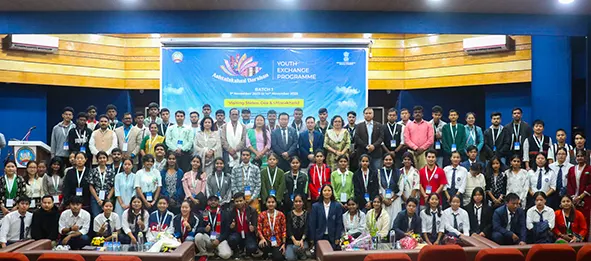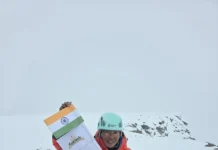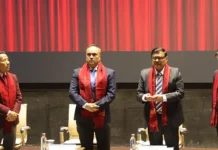RONO HILLS, 1 Nov: Rajiv Gandhi University (RGU) hosted the inauguration of the first batch of the ‘Ashtalakshmi Darshan’ youth exchange programme here on Saturday.
The event marked the commencement of two weeklong intercultural and educational exchange programmes involving 40 student delegates from Goa and Uttarakhand, alongside RGU students, facultymembers, and distinguished guests.
Delivering the keynote address in the inaugural session, RGU Vice-Chancellor (i/c) Prof SK Nayak highlighted the shared values and learning opportunities that such programmes bring. He encouraged the delegates from Goa and Uttarakhand to engage deeply with the local communities, understand their traditions, and carry forward the spirit of national integration envisioned under the Ek Bharat Shreshtha Bharat initiative.
DoNER Ministry Secretary Chanchal Kumar addressed the gathering virtually. Acknowledging the vision and proactive initiative of Prime Minister Narendra Modi, he highlighted the objectives of the Ashtalakshmi Darshan youth exchange programme, which aims to promote inter-regional understanding, cultural appreciation, and awareness about the Northeastern region’s developmental aspirations.
He also elaborated recent government initiatives and investments aimed at strengthening connectivity and fostering inclusive growth in the region.
RGU Registrar Dr NT Rikam presented an overview of the university’s journey, its academic evolution, and its contribution to higher education in Arunachal Pradesh.
He spoke about the state’s rich biodiversity, abundant natural resources, and its strategic importance in India’s developmental roadmap.
Sherri Lalthangzo, economic adviser to Shillong(Meghalaya)-based North Eastern Council (NEC) lauded the efforts of RGU and the DoNER Ministry in creating a vibrant platform for youth engagement.She emphasised the pivotal role of young people in nation-building and cross-cultural understanding, describing them as “ambassadors of unity in diversity.” She also commended the RGU campus for its serene environment and excellent infrastructure.
This was followed by a short video presentation, curated by RGU’s Education Department Assistant Professor Moyir Riba, outlining the basic philosophy behind the term ‘Ashtalakshmi’, coined by PM Modi for the eight Northeastern states.
The Uttarakhand delegation comprises two faculty members and 20 students, led by Haldwani-based MB Government PG College Assistant Professor Dr Deepa Singh, and Halduchar-based Lal Bahadur Shastri Government PG College’s education department faculty member Dr Arun Chaturvedi.
The Goa delegation, led by Subhasini alias Gitali Santosh Kudnekar and Sujan Shankar Sawant, includes 20 students, symbolising the coastal state’s artistic richness and multicultural ethos.
Together, the teams from Goa and Uttarakhand will spend the coming days engaging in field visits, cultural exchanges, and interactive sessions aimed at deepening their understanding of Arunachal and the Northeastern region.
The day’s proceedings began with an orientation and ice-breaking session designed to introduce the delegates to the unique cultural and geographic landscape of Northeast India.
The orientation session commenced with an insightful lecture by former RGU pro-VC Amitava Mitra, who delivered an engaging presentation on the historical evolution, demographic diversity, and socioeconomic potential of the region. He highlighted key developmental prospects in sectors such as horticulture, organic farming, and ecotourism, emphasising their role in shaping a sustainable future for the NE states.
NEC Director Bamin Tanang provided an overview of the council’s mandates and ongoing initiatives aimed at promoting balanced socioeconomic growth across the region.
The orientation and ice-breaking session, themed ‘Goa meets Uttarakhand in Arunachal Pradesh’, was designed to foster camaraderie and mutual understanding among the young participants.
Students from both states were divided into eight mixed teams, each representing one of the eight NE states. Through interactive quizzes and short presentations, the participants explored the geography, festivals, and socio-cultural characteristics of their assigned states.
The inaugural ceremony was attended by more than 200 participants, including university officials, faculty members, delegates, and students.



